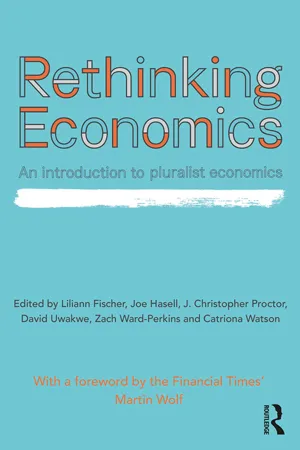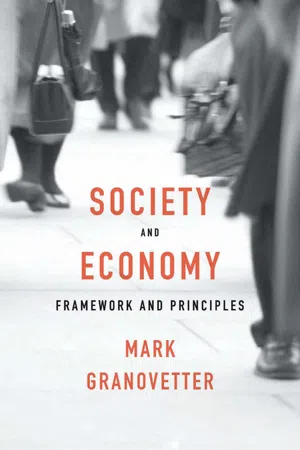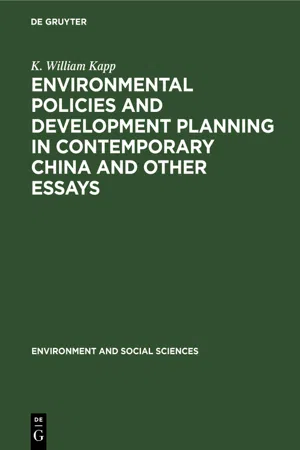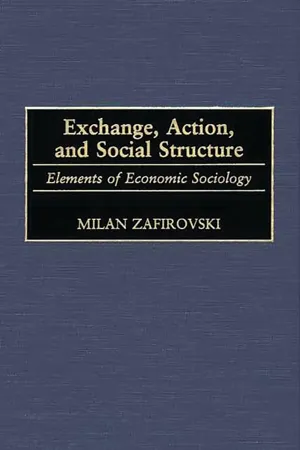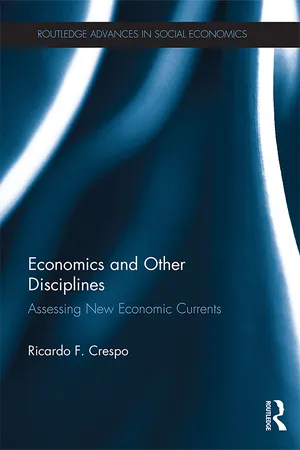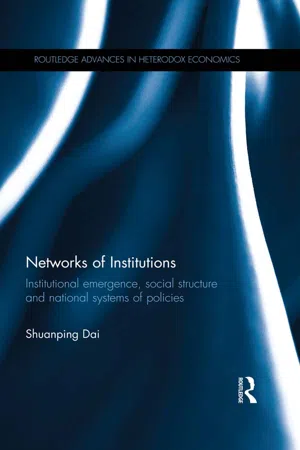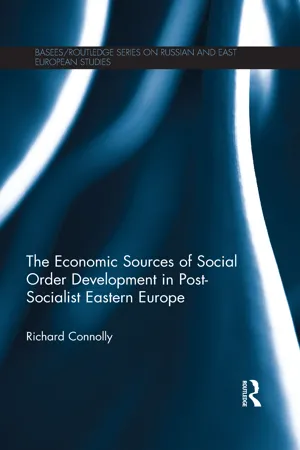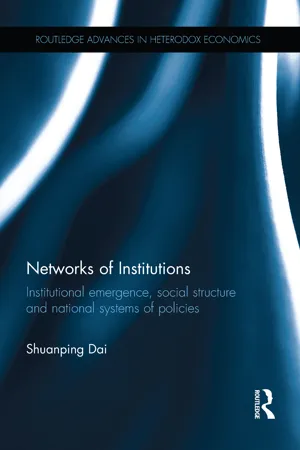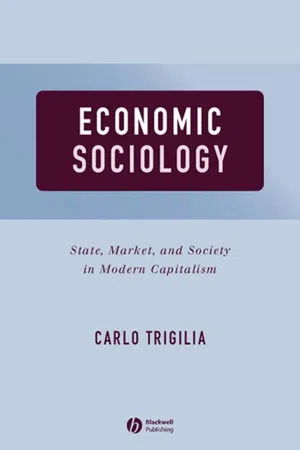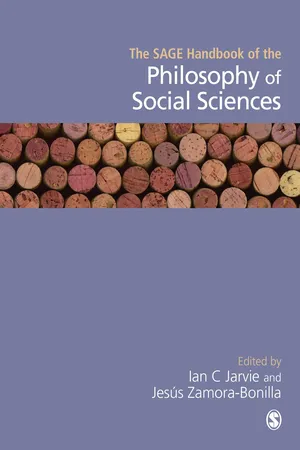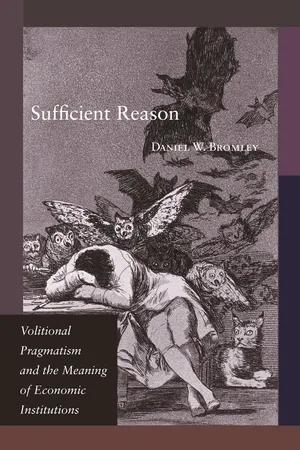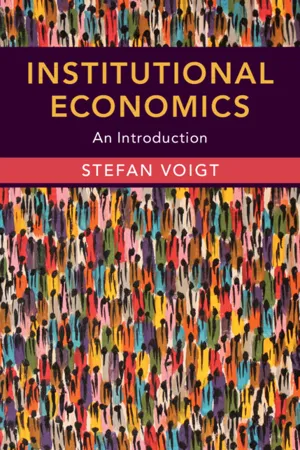Social Sciences
Economy as an Institution
Economy as an institution refers to the system of production, distribution, and consumption of goods and services within a society. It encompasses the rules, norms, and organizations that govern economic activities. As an institution, the economy influences and is influenced by social, political, and cultural factors, shaping the overall functioning of a society.
Written by Perlego with AI-assistance
Related key terms
1 of 5
12 Key excerpts on "Economy as an Institution"
- eBook - ePub
Rethinking Economics
An Introduction to Pluralist Economics
- Liliann Fischer, Joe Hasell, J. Christopher Proctor, David Uwakwe, Zach Ward Perkins, Catriona Watson, Liliann Fischer, Joe Hasell, J. Christopher Proctor, David Uwakwe, Zach Ward Perkins, Catriona Watson(Authors)
- 2017(Publication Date)
- Routledge(Publisher)
the study of the production and distribution of wealth and its role in human welfare.Now turn to the word ‘institutional’. There are important debates about the definition of an institution, but a consensus is emerging that all institutions are systems of embedded social rules, even if that definition needs nuancing in some ways and some important controversies remain.1 Such rules include laws, customs and established norms of behaviour. Consequently, systems of rules such as languages and codes of etiquette are institutions. Money is an institution because it entails shared rules concerning its value, function and exchangeability. Organisations such as states, banks, firms and universities are systems of rules, and hence also institutions. Accordingly, ‘institutional economics’ becomes the study of those institutions that are tied up with the economy and the production and distribution of wealth. In brief, institutional economics is the study of economic institutions.Note that neither economics nor institutional economics is defined here in terms of (say) analytical techniques or basic assumptions, such as rationality or utility maximisation, but rather in terms of the real objects of analysis – the institutional frameworks of economic activity. Given this orientation towards real objects of analysis, there is the possibility of recruiting insights from other disciplines – such as philosophy, psychology, law, history, sociology and political science – into the study of economic institutions. Other disciplines can contribute to our understanding of that real domain.The remainder of this essay is divided into five further sections. Section 2 offers a brief history of institutional economics. Section 3 considers some examples of the growing recognition of the importance of institutions in the analysis of economic growth and development. Section 4 addresses the nature and role of the individual and his or her motivations. Section 5 discusses property rights, the role of law and transaction costs. Section 6 concludes the essay with some brief remarks on the development of institutional economics in the future. - eBook - PDF
Society and Economy
Framework and Principles
- Mark Granovetter(Author)
- 2017(Publication Date)
- Belknap Press(Publisher)
5 The Economy and Social Institutions This chapter and the next follow those on norms, trust, and power— fundamental concepts but each offering only a partial account of what creates economic organization. Each of these separate discussions ended with con-sideration of how the subject manifested itself beyond the level of individuals, small groups, or self-contained communities. Such meso- and macro-level considerations inevitably led to some discussion of social institutions, but these accounts were truncated, and here I offer a more systematic argument. I begin by observing that sociology as a discipline is distinctive in a number of ways, but I believe the most significant is its emphasis on all the major aspects of social life, economic, political, social, religious / ideological, and others, and in its assumption that no one such aspect has causal priority. I suggest that any such claim of priority—and such claims are common in the social sciences—foregoes the intellectual and analytical flexibility needed to explain social life. Institutions that impinge on the economy are invariably more than purely economic. As I argue in many particular cases, social, polit-ical, intellectual, legal, and family influences, among others, play key roles in shaping how the economy runs. This interpenetration of institutional sectors creates the unique texture of social life as we experience it, and this is what we need to keep in mind as we try to broaden our understanding of how people create, get, and use those objects and services that we define as meeting our needs. And we need always keep in mind, as I emphasized in the preceding three chapters, that important as what happens to individuals and small - K. William Kapp(Author)
- 2020(Publication Date)
- De Gruyter(Publisher)
Indeed, institutional economics rejects the thesis that economic science must confine its theo-retical analysis to the study of rational human conduct. 4 In this context you may also ask what are 'institutions'? I shall make no attempt to offer a satisfactory, definition of institutions because to do so would call for a philosophical or rather an anthropological inquiry into the mutual relationship of man and culture, which it would be foolhardy to attempt within the time at our disposal. However, let me say at least that the concept of institution in this context does not refer to legal forms of organization as for instance, to use a primitive example, the Federal Reserve System; the term is to be understood rather as referring to stabi-lized forms of behavior, habits of thought and conduct including group habits and behavior patterns which have been developed in, and are taken 3. A. G. Gruchy, Modern economic thought, New York, 1947, pp. 550, 552. 4. In fact, there are some economists who hold the view that the tendency of using formal rationality as the exclusive perspective for the study of human behavior has unduly narrowed the scope of economic inquiry and that the assumption of rationality should be dropped from economics as a permissible assumption. Arthur Schweitzer, The method of social economics, (mimeographed and privately circu-lated) p. 48, see also pp. 16-17. The critique of institutional economics 151 over from the past and are enduring in the present. Needless to add that institutions understood in this fashion have their origin in the nature of man and are human and social achievements. And yet, as more or less stabilized forms of behavior they tend to assume an autonomy of their own and mould human conduct. For Veblen it was, therefore, axiomatic that institutionalized behavior patterns may be more or less out of date at any given point of time.- eBook - PDF
Exchange, Action, and Social Structure
Elements of Economic Sociology
- Milan Zafirovski(Author)
- 2001(Publication Date)
- Praeger(Publisher)
More precisely, economic so- ciology identifies and examines the effects of social phenomena on eco- nomic actors and behaviors (Weber 1949:45). Hence, economic sociology centers on the presence and salience of sociological relations in the econ- omy (Weber 1968:63; Wieser 1967:151–53), including the operation of exchange and competition (the sociology of the market). Particularly em- phasized is the societal “heteronomy” or determination of economic aims (Weber 1975a:84) (i.e., the social construction of motives and goals (in- cluding utility, wealth, or profit) in economic behavior), as well as of ec- onomic institutions such as markets and firms (Granovetter 1992a). The central themes of economic sociology therefore involve social insti- tutions, relationships (networks), and embeddedness and their importance in shaping economic behaviors and processes (Carruthers 1997a). In this regard, the core of economic sociology is often considered the analysis of institutions (Schumpeter 1954a:9–22; Stinchcombe 1997) and their impact on individual economic behavior versus mechanisms (e.g., markets per se) dealt with by pure economics (but for recent advocacy of social mechanisms in social theory, cf. Hedstrom and Swedberg 1998). In this connection, economic sociology postulates institutionalized individualism/motivation in economic behavior rather than innate propensities (e.g., the propensity for exchange, maximization, and calculation), as does orthodox economics, the An Overview of Economic Sociology 3 leading principle of which is that “every agent is actuated only by self- interest” (Edgeworth 1967:16). Generally, economic sociology observes market-economic variables as so- cial phenomena by virtue of being outcomes of social action/interaction within the setting of larger societal structures, including institutional ar- rangements, cultural patterns, and historical conditions. - eBook - PDF
- Ricardo F. Crespo(Author)
- 2017(Publication Date)
- Routledge(Publisher)
7 Institutional economics The study of institutions as key figures in economic life has a long tradition. As in the case of happiness economics, current institutional economics mixes elements drawn from ancient political economy with other taken from modern sciences – especially from sociology. We could sustain that the birth of institutional economics occurred with Thorstein Veblen at the beginning of the twentieth century, though many different ways of approaching institutions can be discerned in economics before Veblen. In this chapter, nonetheless, I will appraise Veblen’ s ideas and other contemporary institutionalist currents in their consideration or negligence of practical reason and their kind of naturalism following Veblen”s thread of thought. It is important to review different forms of institutionalism because, as explained in Chapter 1, some connections with other social sciences that have reemerged in the last years have been “domesticated” (Davis 2008: 365) by standard economic logic and its instrumental maximizing rationality. In this chapter, I will first provide a concise review of the history of twentieth century economic institutionalism. Then, before analyzing Veblen’ s institu- tionalism, resurging contemporary Veblenian currents and up-to-date theories of institutions, I will briefly consider the basic concepts of institutionalism – agency, habits and institutions – from the perspective of classical practical reason. This last examination will help to discriminate between institutionalist currents fitting with the argument of this book and currents that have been “domesticated” by economic logic. Economics and institutions Institutions as “stable, valued, recurring patterns of behavior” (Huntington 1965: 394) are necessary for the functioning of society, the predictability of people’ s behavior and the construction of social sciences, including economics. - eBook - PDF
Networks of Institutions
Institutional Emergence, Social Structure and National Systems of Policies
- Shuanping Dai(Author)
- 2015(Publication Date)
- Routledge(Publisher)
The individual actions are transactions that encompass bargaining transactions, managerial transactions, and rationing transactions, rather than the behavior of individuals or the exchange of commodities applied in classical economics. 20 Basic definitions and theoretical conceptions In real economic activities, the transactions at the individual level are organized, controlled, liberated, and expanded by the collective action units in a going concern way of specific working rules —for example, regulations, laws, and informal hidden customs. In this way, the significance of institutional economics unfolds. Institutional economics, shifting from the classical framework of the exchange of commodities, focuses on the relationships among humans. It is there-fore behavioristic and must subsequently treat the economic behavior of indi-viduals as its fundamental unit of analysis. Following the Veblen-Commons paradigm, Bush (1987:1076) defines an insti-tution as “a set of socially prescribed patterns of correlated behavior.” In the “socially prescribed” sense, as the basic elements of society, all institutions func-tionally interrelate and are driven by individual behavior. The prominent term of the definition, “patterns of correlated behavior,” embodies an important concept— namely, values, including ceremonial value and instrumental value, that acts as the correlater among behaviors. Hence, an institution, in the terminology of Bush, can be considered as a social result of interacting human behaviors (ceremonial or instrumental, or both) under certain values (ceremonial or instrumental, or both). However, this definition does not capture the dynamic hallmarks of institu-tions in terms of interacting agents because the connected structure of behavioral patterns correlated by behavior and values are given. Furthermore, such behavio-ral definitions, as Foster (1981b) and Tool (1979) concur, have been criticized as being misleading. - Richard Connolly(Author)
- 2012(Publication Date)
- Routledge(Publisher)
3 In economics, institutions were, at least until the 1970s, largely taken for granted. The dominant neo-classical paradigm assumed a frictionless world in which the effects of government and institutions were ignored, thereby assuming transaction costs to be zero (see, for example, Arrow and Debreu, 1954). Once it was accepted that different institutional structures might raise or lower transaction costs for economic actors, it became apparent that the elegance of rational choice based attempts at explaining economic behaviour might be matched only by their limited utility in explaining economic reality. In political science, institutions – particularly those associated with the state – had been perceived as neutral arenas upon which certain political actors imposed their own preferences (e.g. rational choice theories and pluralist accounts), or as reflections of social structures (interest-group theories and Marxist accounts).The rise of institutionalism in both economics and political science can be seen as a reaction to the prior ascendancy of rational choice based, deductive methods in the social sciences and as a move towards incorporating a more inductive and contextually sensitive approach to explaining both politics and economics. In economics, the new institutional economics (NIE) literature emphasized the context in which economic behaviour is located, with institutions shaping the incentives and constraints imposed upon economic actors, and thereby raising or reducing transaction costs and increasing or decreasing the economic efficiency of a given social system. Indeed, institutions have been seen by some as offering the best explanation of variation in patterns of economic growth and prosperity throughout history.4 Furthermore, such theorists argue that not only are economic institutions thought to determine the aggregate economic growth potential of an economy, but also as shaping the potential economic outcomes in the future, such as the future distribution of resources amongst groups within a society.Broadly speaking, both strands of literature share the view that institutions – both economic and political – are not entirely derivative of either social structures or the preferences of individuals, and that institutions have an independent effect on economic and political behaviour, the influence of which fluctuates depending on the historically specific conditions of each case. However, the diverse array of methods employed to analyse the effects of institutions on political and economic behaviour render the field a conceptual mélange, with different approaches taking varying positions on the role of structure and agency, rationality and rule-following, and the extent to which institutions evolve or are the product of purposeful design.- eBook - ePub
Networks of Institutions
Institutional Emergence, Social Structure and National Systems of Policies
- Shuanping Dai(Author)
- 2015(Publication Date)
- Routledge(Publisher)
working rules—for example, regulations, laws, and informal hidden customs. In this way, the significance of institutional economics unfolds. Institutional economics, shifting from the classical framework of the exchange of commodities, focuses on the relationships among humans. It is therefore behavioristic and must subsequently treat the economic behavior of individuals as its fundamental unit of analysis.Following the Veblen-Commons paradigm, Bush (1987 :1076) defines an institution as “a set of socially prescribed patterns of correlated behavior.” In the “socially prescribed” sense, as the basic elements of society, all institutions functionally interrelate and are driven by individual behavior. The prominent term of the definition, “patterns of correlated behavior,” embodies an important concept—namely, values, including ceremonial value and instrumental value, that acts as the correlater among behaviors. Hence, an institution, in the terminology of Bush, can be considered as a social result of interacting human behaviors (ceremonial or instrumental, or both) under certain values (ceremonial or instrumental, or both). However, this definition does not capture the dynamic hallmarks of institutions in terms of interacting agents because the connected structure of behavioral patterns correlated by behavior and values are given. Furthermore, such behavioral definitions, as Foster (1981b) and Tool (1979) concur, have been criticized as being misleading. For instance, Hodgson (2006 :3) argues that such a defining approach “would lead us into presuming that institutions no longer existed if their associated behaviors were interrupted.” For example, the British monarchy exists as representative of ceremonial institutions, but independent of the royal family’s behavior and royal ceremony, and from an alternative angle, Hodgson (2006 - eBook - PDF
Economic Sociology
State, Market, and Society in Modern Capitalism
- Carlo Trigilia(Author)
- 2008(Publication Date)
- Wiley-Blackwell(Publisher)
On the side of sociology, the development of neo-utilitarian (or neo-institu-tional) economic theories triggered, in turn, new attempts to explain organiza-tional variety. In these studies, the rational choice of the most efficient institutional solutions, typical of the economic approach, was contrasted to explanations that underlined the autonomous role of cultural factors and social networks in influ-encing economic organization. For sociology too, this orientation is also critical of traditional approaches adopted by the discipline – in particular, that of Talcott Parsons. This has led to an attempt to develop a new theory of economic action. It was in this context that another branch of the new economic sociology emerged, through an approach that is micro-oriented and theory-driven. 3.1 The analysis of transaction costs From the seventies on, “institutional economics” attracted a growing interest. This approach questioned the idea of the firm as a production function, that is, as a productive unity whose boundaries were substantially defined by technological requisites. Traditional micro-economics was criticized for overlooking the problem of the firm’s boundaries and concentrating on the study of the market. Traditional analyses seem unable to explain why some “transactions” (that is, some exchanges of goods and services) take place in the market and others are internalized in the firm, and why in some cases the firm grows and relies more on hierarchy while in others it stays small. The new approach sees the market, the firm, and the various forms of inter-firm collaboration as economic institutions that can be explained as “networks of contracts” between subjects aiming to maxi-mize their interests. Unlike the standard neo-classical model, the existence of vari-able “transaction costs” is recognized. They result from conditions of uncertainty and lack of information, which can create favor opportunistic behaviors. - Ian C Jarvie, Jesus Zamora-Bonilla, Ian C Jarvie, Jesus Zamora-Bonilla, Author(Authors)
- 2011(Publication Date)
- SAGE Publications Ltd(Publisher)
After explaining some basic concepts and principles of the contemporary theory of institutions, I will focus on the analysis of the mechanisms of the emergence and evolution of institutions. I will then proceed by providing the distinc-tion between formal and informal institu-tions before discussing the problem of path dependence in the last part of the article and closing with a short epilogue. BASIC CONCEPTS AND PRINCIPLES OF THE THEORY OF INSTITUTIONS Institutions are normative social rules, that is the rules of the game in a society, enforced either through the coercive power of the state or other enforcement agencies that shape human interaction (Mantzavinos, 2001). 15 Institutions as normative patterns of behav-ior serve to (partially) solve the problem of cooperation in a society by providing a more or less permanent platform of con-flict resolution. They define the rules of the socio-economic game, that is, the strategies which individuals are allowed to employ in order to pursue their goals and solve their problems. The existence of social institutions provides the first step towards overcom-ing the Hobbesian problem of social order, the second being the cooperation of indi-viduals via exchange within the institutional framework. It is quite common in the literature to employ the term “institution” in order to designate organizations of every kind. In order to avoid confusion, it is useful to distin-guish between institutions and organizations. Institutions are the rules of the game; orga-nizations are corporate actors, that is, groups of individuals bound by some rules designed to achieve a common objective (Coleman, 1990). They can be political organizations such as political parties, educational orga-nizations such as universities, or economic organizations such as firms.- eBook - PDF
Sufficient Reason
Volitional Pragmatism and the Meaning of Economic Institutions
- Daniel W. Bromley(Author)
- 2010(Publication Date)
- Princeton University Press(Publisher)
This glorious future would reassure the place of economics as the linchpin of the social sciences—psychology, law, history, sociology, and economics—all predicated on, and carefully elaborating, the grand axioms, assumptions, and models of neoclassical economics. In advocat- ing this utopian agenda, North was moved to write: 68 • Chapter Five Defining institutions as the constraints that individuals impose on themselves makes the definition complementary to the choice theoretic approach of neoclassical economic theory. Building a theory of institu- tions on the foundation of individual choice is a step toward reconciling differences between economics and the other social sciences. The choice theoretic approach is essential because a logically consistent, poten- tially testable set of hypotheses must be built on a theory of human behavior. The strength of microeconomic theory is that it is constructed on the basis of assumptions about individual human behavior (even though I shall argue for a change in those assumptions . . . ). Institu- tions are a creation of human beings. They evolve and are altered by human beings; hence our theory must begin with the individual. At the same time, the constraints that institutions impose on individual choices are pervasive. Integrating individual choices with the con- straints institutions impose on choice sets is a major step toward unify- ing social science research. (North 1990, p. 5) North seems to have rather more confidence in the ability of contempo- rary economics to explain choice than we find among those who have devoted their professional careers to this difficult challenge—and there- fore might be presumed to know something about it (Bowles 1998; Hodg- son 1988, 1998; Lawson 1997; Little 1949; Rabin 1998; Sen 1977, 1982; Shackle 1961, 1992). - eBook - PDF
Institutional Economics
An Introduction
- Stefan Voigt(Author)
- 2019(Publication Date)
- Cambridge University Press(Publisher)
He proposes to define institutions as “a system of rules, beliefs, norms, and organizations that together generate a regularity of (social) behavior” (2006, 30, italics in original) and points to some advantages of his pro- posal. I prefer not to use Greif’s definition because it has some disadvantages. His definition does, indeed, encompass both the rules of the game and the outcome of the game. If there is no regularity in behavior, no institution exists. Economists are interested in discovering how institutions influence economic results such as growth and income. If the definition of an insti- tution is already based on the outcome, then a cause–effect relationship is difficult to establish. The conflation of at least four elements – (1) rules, (2) beliefs, (3) norms, and (4) organiza- tions – in a “system” seems to make exact measurement almost impossible. Moreover, how exactly are these ingredients trans- formed into behavioral regularities? 1.2.2 Interactions between Internal and External Institutions Institutions come in all sizes and flavors; they differ not only with regard to their enforcement, but also with regard to the content of the rule component. As the rule components of institutions have various origins and hence are likely to set conflicting incentives for behavior, we are interested in the interactions between institutions of different types. It is easy to imagine that the incentive effects of some external institution might be corroborated by some internal institution. By the same token, it is possible that internal institutions counter or neutralize the effect of external institutions. Interactions like these should play a significant role in how well an 1.2 Institutions: Functions, Types, Interrelationships 19 institution is able to reduce uncertainty. Logically, there are four kinds of interaction between institutions: 1. Institutions can be characterized by a neutral relationship.
Index pages curate the most relevant extracts from our library of academic textbooks. They’ve been created using an in-house natural language model (NLM), each adding context and meaning to key research topics.
